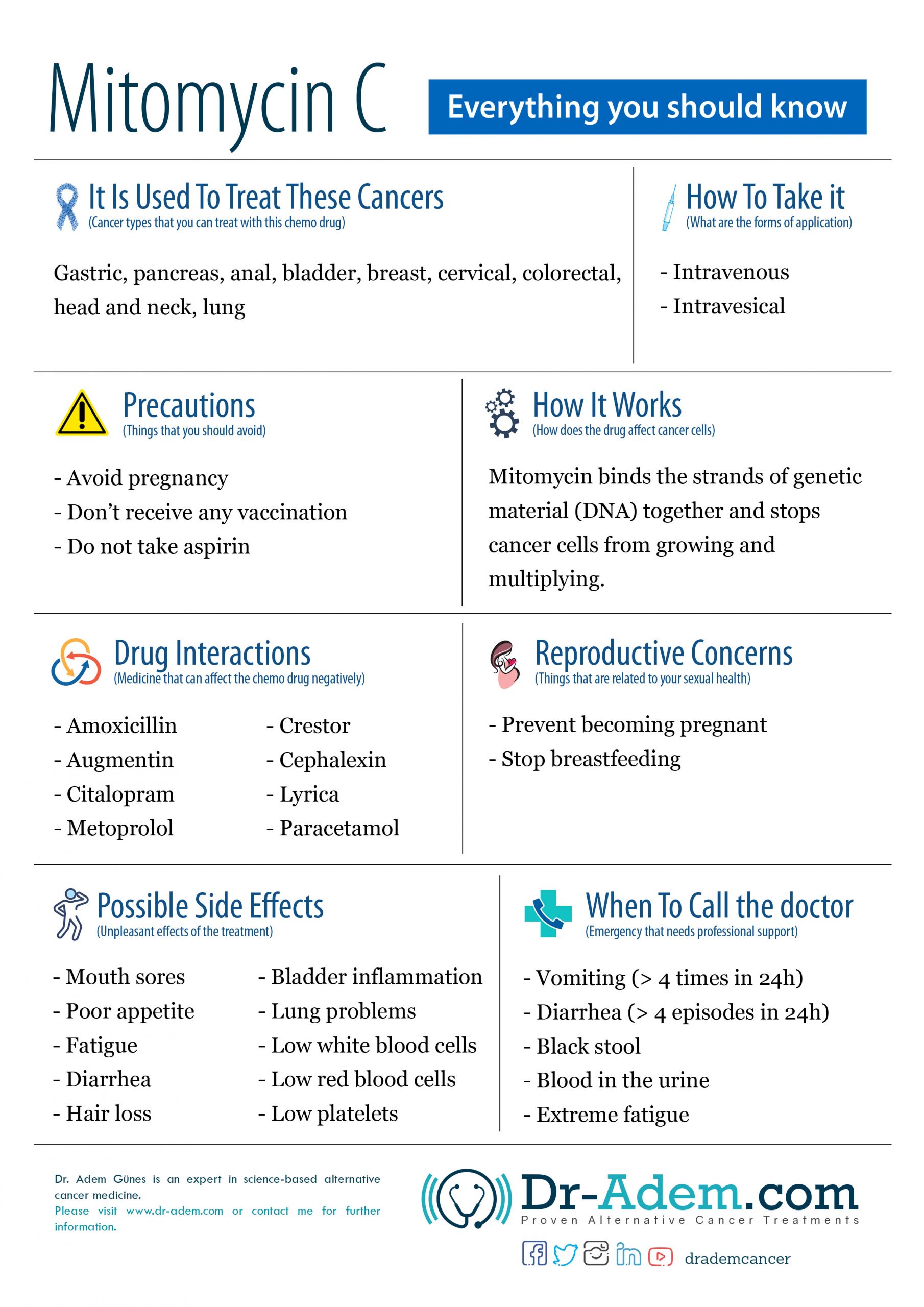Fact Sheet – Everything You Should Know
In this Mitomycin C fact sheet, you’ll get to know about the precautions, usage, possible side effects, and the types of cancer that you can treat with this chemo drug.

Embed this Infographic on your site:
<a href='https://dr-adem.com/mitomycin-c-fact-sheet/'><img src='https://dr-adem.com/wp-content/uploads/2019/11/Mitomycin-C2-scaled.jpg' alt='Mitomycin C Fact Sheet'/></a>Here’s the Mitomycin C fact sheet to get detailed information about Mitomycin C
It Is Used To Treat These Cancers
(Cancer types that you can treat with this chemo drug)
- Gastric
- Pancreas
- Anal
- Bladder
- Breast
- Cervical
- Colorectal
- Head and neck
- Lung
How To Take it
(What are the forms of application)
- Intravenous
- intravesical
Precautions
(Things that you should avoid)
- Avoid pregnancy
- Don’t receive any vaccination
- Do not take aspirin
- Vesicant drug
Mechanism of Action of Mitomycin C
(How does the drug affect cancer cells)
Mitomycin is an antineoplastic antibiotic. It binds to the DNA strands, leading to cross-linking between them and inhibiting DNA synthesis and function. It doesn’t target any specific phase of the cell cycle, which means that the cells don’t need to go through the mitosis process for the drug to work.
Drug Interactions
(Medicine that can affect the chemo drug negatively)
- Amoxicillin
- Augmentin
- Citalopram
- Metoprolol
- Crestor
- Cephalexin
- Lyrica
- Paracetamol
Reproductive Concerns
(Things that are related to your sexual health)
- Pregnancy prevention during and until 6 months after the treatment (men and women)
- Stop breastfeeding
- Consider sperm freezing if willing to bear children
Possible Side Effects
(Unpleasant effects of the treatment)
- Mouth ulcers
- Pruritus (itching)
- Nausea & vomiting
- Kidney toxicity
- Shortness of breath
- Cough
- Pneumonia
- Skin rashes
- Loss of appetite
- Fatigue
- Diarrhea
- Hair loss
- Bladder inflammation (usually associated with bleeding)
- Changes in the urination (pain, slower urine flow, increased night-time urination)
- Lung toxicity
- Low white blood cells: raise the risk of bacterial infection
- Low red blood cells: can lead to fatigue, general lack of interest and drive to be active
- Low platelets: can lead to bleeding (nose, gums) and in extreme cases to internal bleeding (intestinal, brain, joints)
- Infertility
When To Call the doctor
(Emergency that needs professional support)
- Vomiting (>4 times in 24h): can lead to severe dehydration and electrolyte disbalance
- Diarrhea (>4 episodes in 24h): can also lead to severe dehydration and electrolyte disbalance
- Black stool: can be a sign of intestinal bleeding
- Blood in the urine
- Extreme fatigue: can be a sign of severe anemia (low blood cells)
- Fever > 37,8°C


